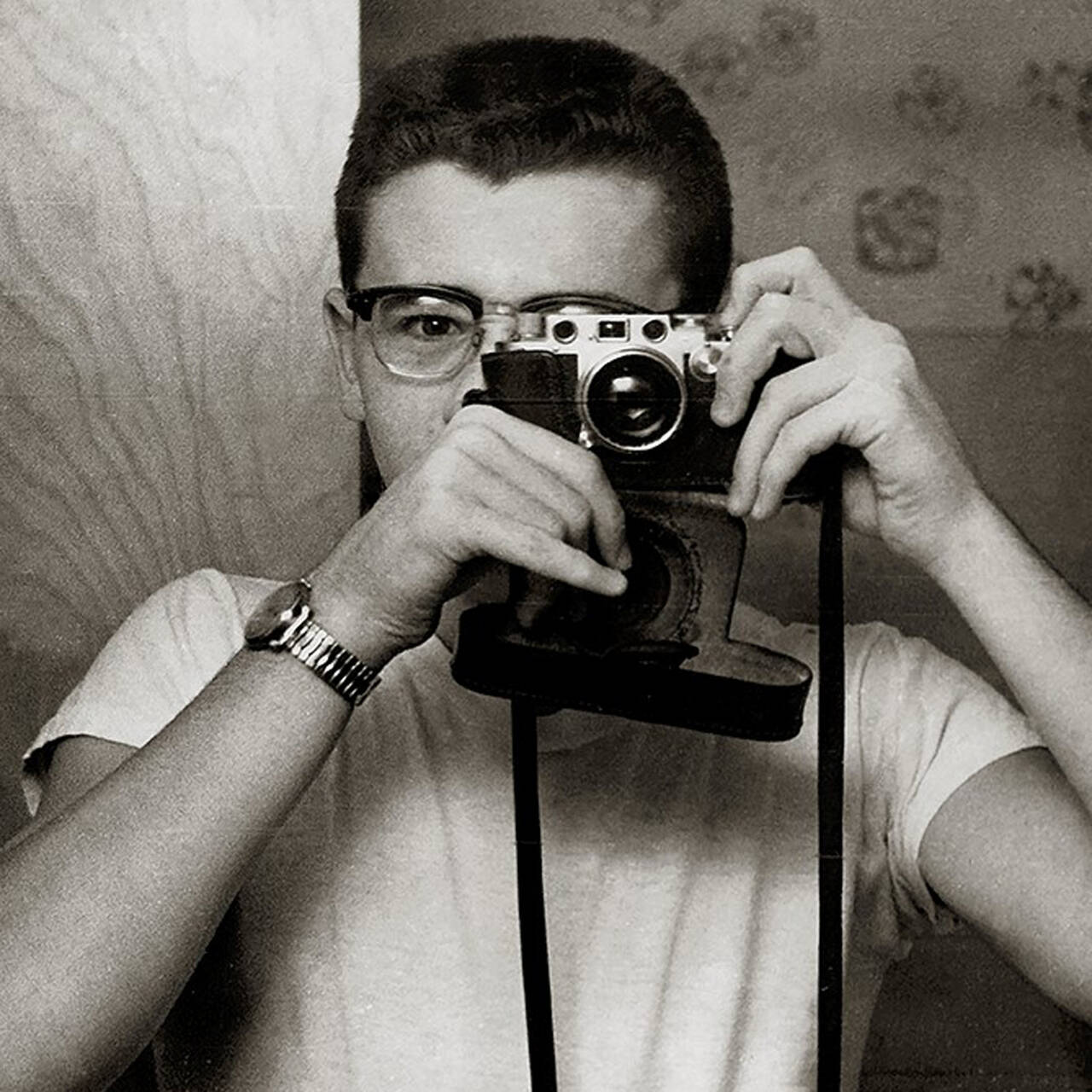John Akomfrah’s video work “The Unfinished Conversation” is an homage to cultural theorist and sociologist Stuart Hall. Award-winning Frankfurt filmmaker Oliver Hardt has been familiar with the work for many years and reveals what significance Stuart Hall has for John Akomfrah and the Black Diaspora.
John Akomfrah’s film “The Unfinished Conversation” (2012), which is on show in the exhibition JOHN AKOMFRAH. A SPACE OF EMPATHY in the SCHIRN, is a tribute to Jamaican-born sociologist and cultural theorist Stuart Hall (1932-2014). The three-channel video installation consists largely of archive recordings of Hall’s radio and television appearances on the BBC. In the video, Hall talks about his memories of his country of origin, Jamaica, back then still a British colony, and his arrival in the United Kingdom in the 1950s as a member of the Windrush generation, which comprises people who migrated from the Commonwealth states between 1948 and 1971. The name is taken from the eponymous ship that brought the first immigrants from the Caribbean across the Atlantic. He also discusses his time at Oxford University and his later role as one of the founding figures of cultural studies in Britain. At one point in the film Hall remarks: “When I ask anyone where they´re from I expect nowadays to be told an extremely long story” and thus summarizes the essence of the Black Diaspora experience, as it existed particularly in the United Kingdom but also in other European countries: For example, making this reality of life more differentiated has also been a central concern for Black people in Germany since the 1980s.

Stuart Hall, Image via ceasefiremagazine.co.uk
In this instance, it was above all Black feminist activists who sought to make their history and present visible. The pioneers of the Afro-German movement include among many others the poet and activist of the early days, May Ayim (1960-1996), US writer and civil rights activist Audre Lorde (1934-1992), who lived in Berlin for a time, and historian Katharina Oguntoye (born 1959). The interaction between the various European and US discourses on Black identities and their place in societies that insist on defining themselves as ‘white’ led to a deep bond between them that continues to resonate today.
Identity as an unfinished process
As “The Unfinished Conversation” vividly shows, Hall’s persuasive powers in these discourses stem from his ability to present complex historical contexts precisely and calmly. Akomfrah’s montage of image and sound expands the conversation by giving viewers the space to reflect on their own experiences. With his carefully compiling of the archive sequences Akomfrah creates a complex narrative, which questions the one-sided Western view of history regarding identity and colonialism and also reflects his own biography as a migrant: Born in 1957 in Ghana, he moved to the United Kingdom as a child in the early 1960s.

Audre Lorde, Katharina Oguntoye, May Ayim, Image via tumblr.com

Audre Lorde and May Ayim at Winterfeldtplatz in Berlin-Schöneberg (c) Dagmar Schultz, Image via commons.wikimedia.org
Just like John Akomfrah, Stuart Hall addressed questions of identity throughout his life and did so in a way that still helps us navigate the complex issues of origin, belonging, and race today. In his autobiography “Familiar Stranger. A Life Between Two Islands,” he writes: “We tend to think of identity as taking us back to our roots, the part of us which remains essentially the same across time. In fact, identity is always a never-completed process of becoming – a process of shifting identifications, rather than a singular, complete, finished state of being.” For Hall, Caribbean culture is a blueprint for a hybrid society in which everyone comes from somewhere else. He describes his own family backgrounds as an amalgam of African, Jamaican, Scottish, and Portuguese-Jewish influences. His experiences of living in and between several worlds would lead Hall to the realization of how culture works in general: not as a stable, linear, progressive development eternally linked to purported origins but as a sequence of movements, diasporic ruptures, shifts and adaptations. ‘Routes, not roots’ – paths along which culture has always moved, constantly reconfiguring itself without apparent roots to which it could return.
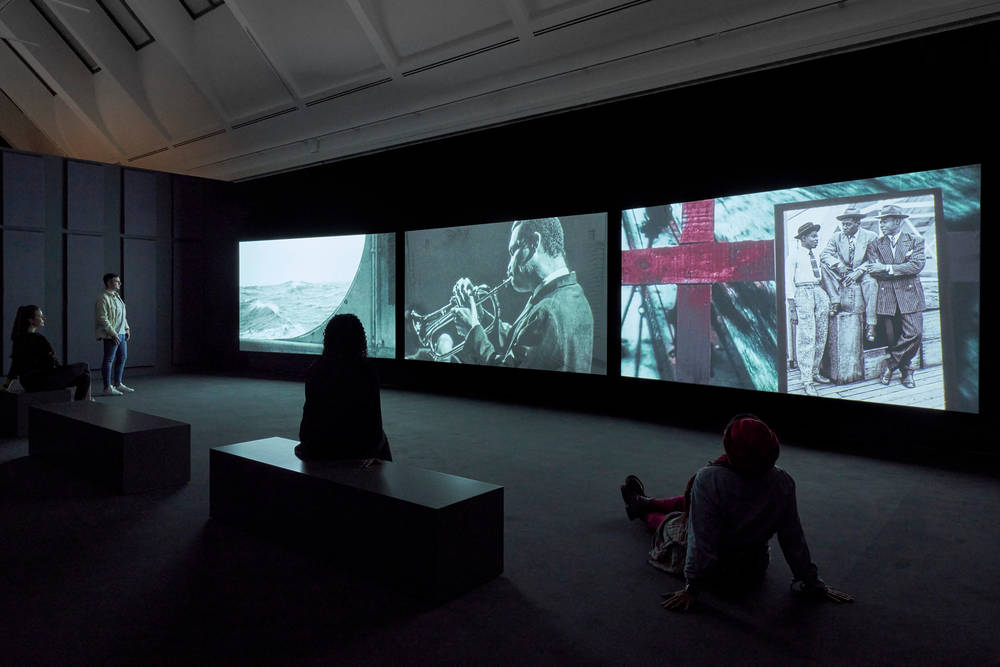
STUART HALL AND THE BLACK AUDIO FILM COLLECTIVE
Stuart Hall has always been an important point of reference for Akomfrah’s artistic work, both as a person and a philosopher. Even the early films that Akomfrah made as a member of the Black Audio Film Collective, founded in 1982, were greatly inspired by the versatile cultural theorist. From the very start, the deconstruction of overly simplistic and monolithic representations of Black life in the British media lay at the heart of the collective’s artistic work. The film collage “Handsworth Songs”, released in 1986, deals with the unrest and rioting that the United Kingdom saw under the repressive politics of Margaret Thatcher and the misrepresentation of events and causes of the unrest in the British media. In terms of both form and content “Handsworth Songs” was a groundbreaking film. Using archive material, inner monologs, and a sophisticated soundtrack, the Black Audio Film Collective created work a portrayal of Black British life which was cinematically intense and empathetic. At the same time, the collective’s work challenged the prevailing division of independent filmmaking into first-world avant-garde versus third-world activism by dissolving the existing dichotomy in favor of a more differentiated view of themselves and current affairs in terms of form and content.

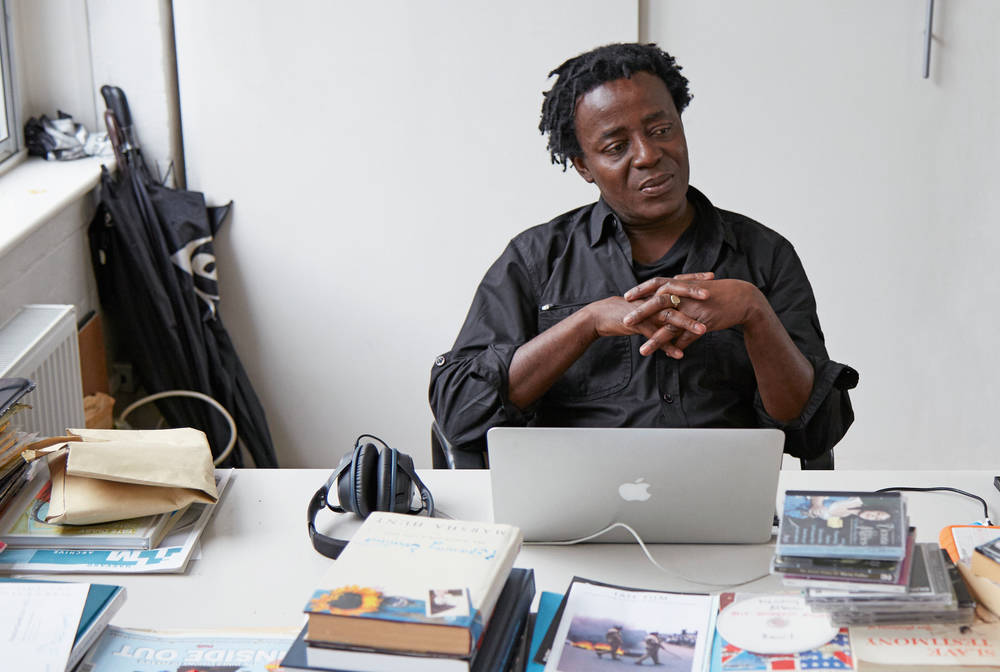
HISTORY IS NOW
In an interview with Julia Grosse, the curator of the Frankfurt exhibition, Akomfrah emphasizes the intimate connection that already existed between himself and Stuart Hall: “He was one of the few people to have seen the first rough version of ‚Handsworth Songs‘. We invited him to look at them and then to discuss them with us because Stuart was an important figure in the life of many Black Britons at the time.” Together they worked on deconstructing colonial and post-colonial narratives and on a new understanding of Black diasporic identity. The formal aspects that would later become fundamental to Akomfrah’s work are already evident in the group’s early output: an affirmative, yet critical approach to archives, the deconstruction of soundtracks, and an insistence on multiple perspectives and a discursive focus. In Akomfrah’s expansive multi-channel projections it is these elements that subsequently become the defining factor for their intellectual and sensory intensity. The open-endedness of the narratives enables the audience to participate in a conversation that is capable of fundamentally altering the way we look at both ourselves and others.
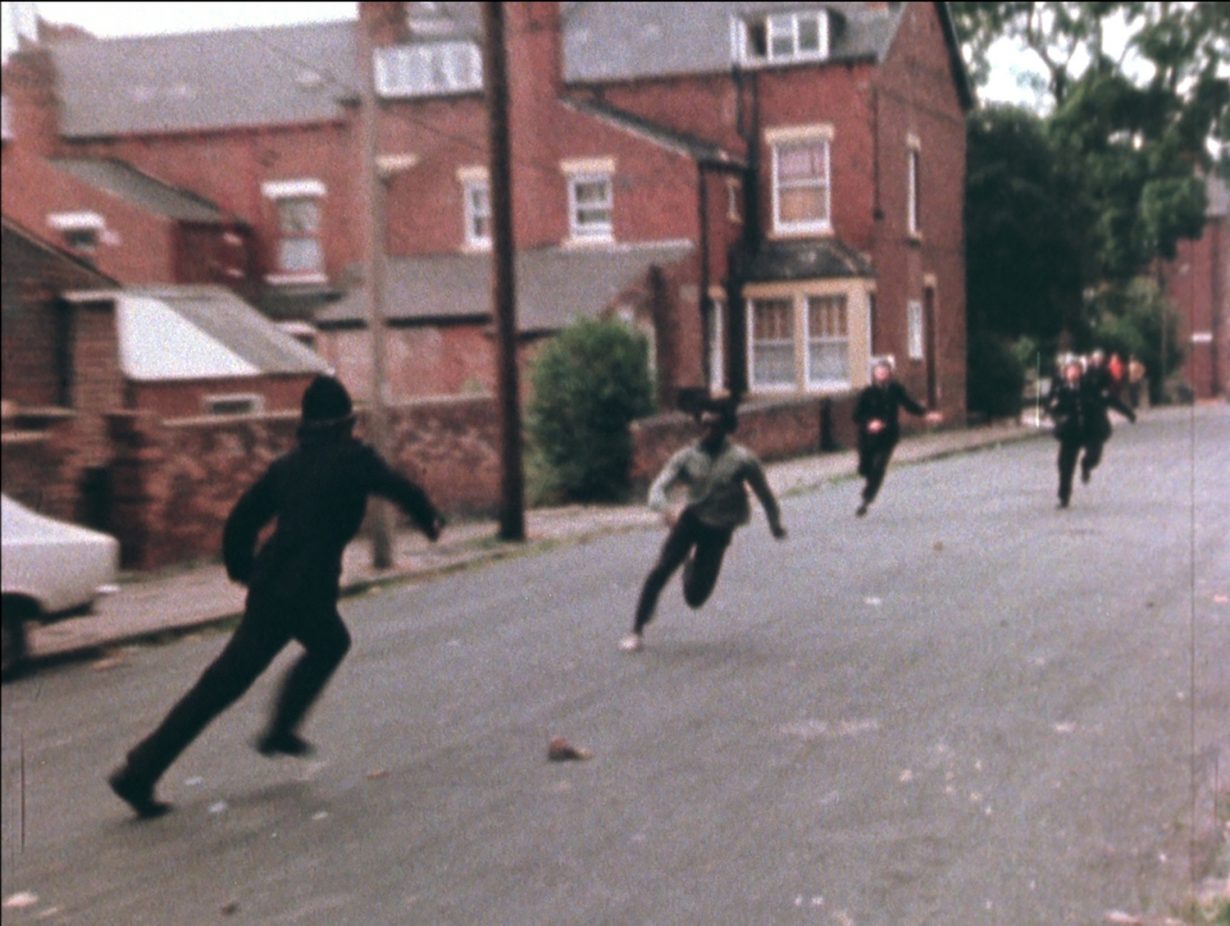
Black Audio Film Collective: Handsworth Song, 1986, Image via artreview.com
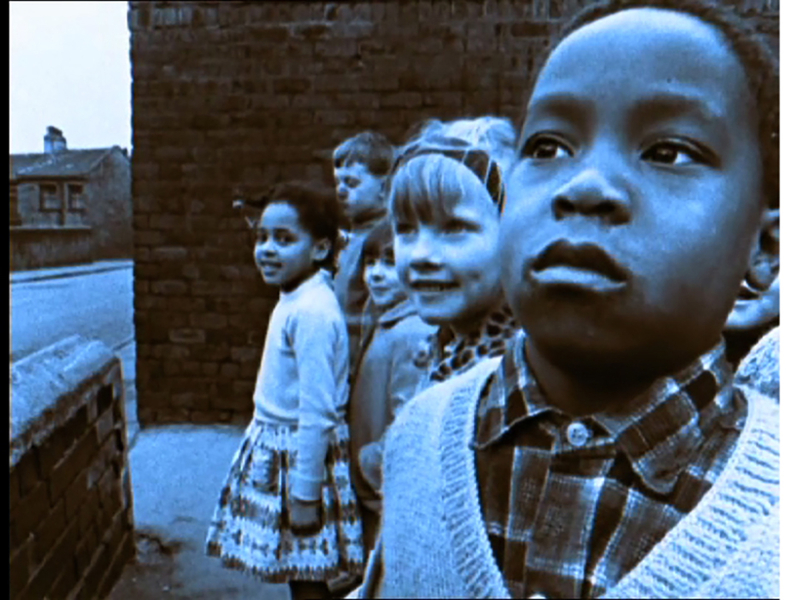
Black Audio Film Collective: Handsworth Song, 1986, Image via artreview.com
A much-cited sentence from “Handsworth Songs” is “There are no stories in the riots, just ghosts of other stories.” What is meant by this is that every struggle against racism and social discrimination must be seen and understood in the context of colonial history. Just as Stuart Hall and John Akomfrah grasp identity as an ongoing process of negotiation with oneself and one’s social environment, decolonization is not something which happened at some point and no longer has any repercussions. On the contrary: As US author James Baldwin once put it, history is not the past. It is the present, something that we carry within us and that determines our existence and thinking more than we might like.
There are no stories in the riots, just ghosts of other stories.
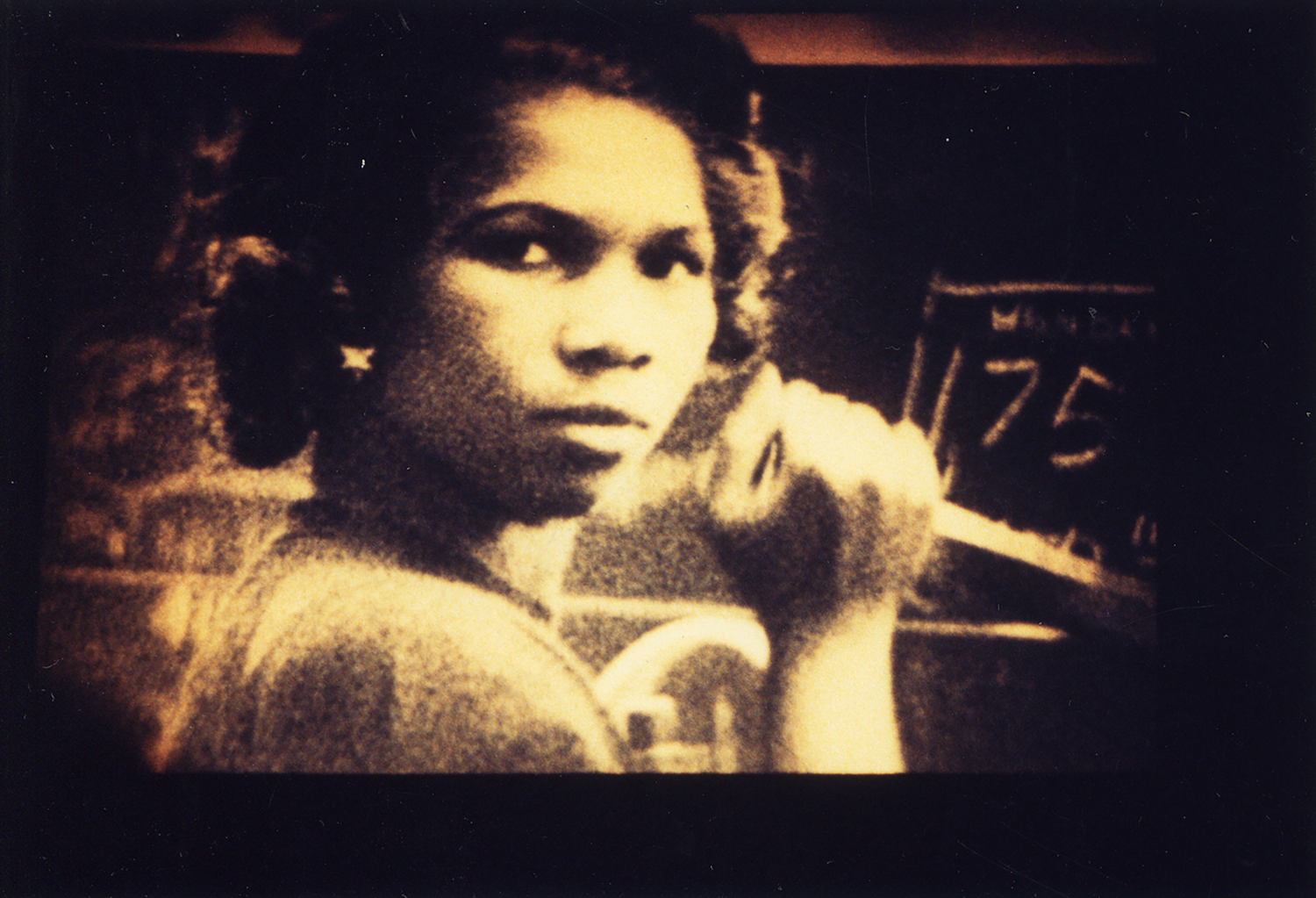
Black Audio Film Collective: Handsworth Song, 1986, Image via artreview.com







